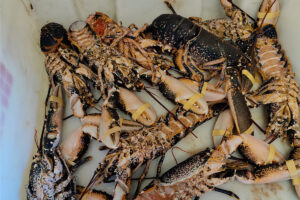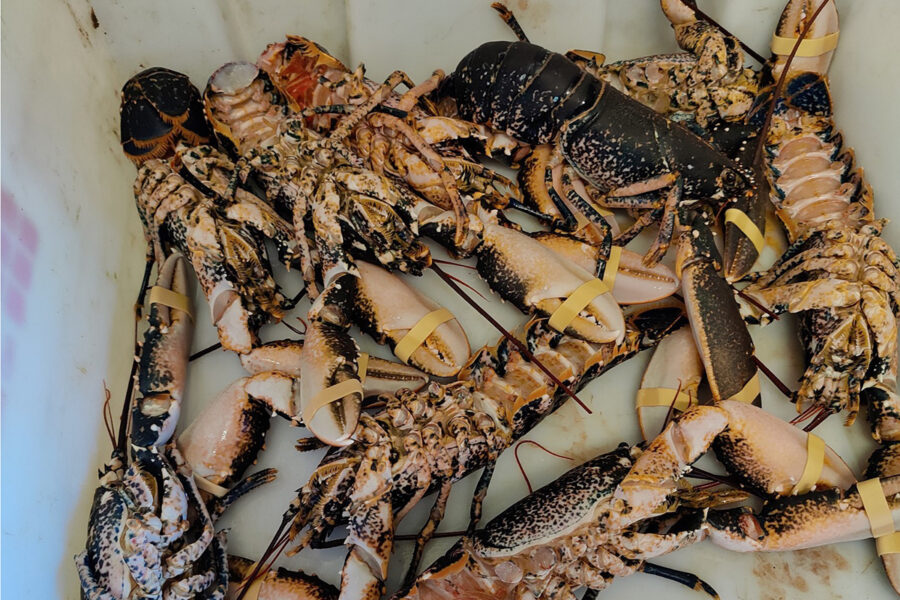With shellfish deaths in the North East of England still continuing more than a year after they began, inshore fishermen have urged the government to take urgent action to halt Tees dredging, reports Tim Oliver.

Local shellfish merchants have reported more lobsters dying in their holding tanks. (Photo: Joe Redfern)
The North East Fishing Collective (NEFC) has written to fisheries minister Mark Spencer expressing its ‘deep concern’ at the lack of government urgency to address the die-offs, which it suspects are caused by contaminated spoil from dredging in the Tees.
Their letter follows the minister’s response to concerns raised by the Environment, Food and Rural Affairs Committee, which has called on Defra to carry out an urgent investigation (Fishing News, 10 November, ‘Defra: No plans to pause Tees dredging’).
Defra has set up an independent group of external experts to assess the evidence, including the possible role of the chemical pyridine, which university scientists have linked to the crustacean deaths.
Joe Redfern, secretary of Whitby Commercial Fishermen’s Association, who has played a leading role in the fight to get to the truth and is a spokesman for the NEFC, said die-offs had begun again after dredging in the Tees restarted on 1 September.
“They’ve eased off in the last week or so, but there have been continuing deaths in the last six or eight weeks since the dredging restarted,” he told Fishing News.
“There have more reports from the merchants of lobsters dying in tanks and also washing up on the beaches as well, from south of the Tees area to down to Skinningrove and Staithes north of Whitby. Krill have been washing up on beaches as well, not just crustaceans.”
The NEFC letter tells the minister that ‘an environmental catastrophe has happened – and is continuing to happen – along the North East coastline’ since 25 September, 2021, when the dredger Orca began dredging 148,000t over a 10-day period across a 2km entrance to the Tees channel. From the following day, ‘fishers’ catches were decimated’.
The letter says: “Thousands of crustaceans littered the shores in scenes never seen before; the public were as alarmed as those in the fishing industry. Nothing of this magnitude has ever been seen before in our waters.”
It highlights the industrial heritage of the Tees Valley area and the ‘toxic footprint’ of the iron and steel, shipbuilding and chemicals industries, which has been discharged into the Tees for many years.
The NEFC tells the minister that since phase one of the Tees Freeport dredging began on 1 September this year, ‘we have once again seen a considerable increase in mass wash-ups and die-offs of marine life’.
Responding to his statement that the independent committee to investigate the deaths would report ‘in a timely manner’, the NEFC says action to stop further damage is needed ‘urgently’.
“A timely fashion cannot mean after the Freeport dredge has been dumped – or even partly dumped – six miles out at the start of phase two. The dredging must be stopped now.”
Telling the minister the position is ‘extremely precarious’, it says the local area may already be facing ‘an extinction episode’.
The NEFC is calling for:
- The Freeport dredge to be put on hold to stop any further pyridine or other toxic elements polluting the marine ecosystem. • Thorough and relevant testing to be carried out on sediment for maintenance and capital dredging for existing licences immediately.
- Industry representatives, including fishermen and their independent scientists and experts, to be part of the proposed expert independent panel to ensure transparency.
- Data to be published before peer review to keep stakeholders and the public up to date and ensure questions can be raised.
- Environmental protection requirements and standards for dredging by the government and agencies to be updated.
- Compensation at the earliest opportunity for those affected.
- Efforts to restock the area to be undertaken only after the Freeport dredge material is tested, reviewed and taken to landfill.
The NEFC tells the minister: “This cannot wait in a ‘timely manner’ to be undertaken. It is deadly serious, and it is happening now.”
‘There should be a judicial review’
Stan Rennie, an inshore vessel owner and skipper from Hartlepool, chair of Hartlepool Boatmen’s Association and a member of the NEFC, said the level of stock reduction in the region was ‘criminal’ and called for a judicial review.
“Those found responsible for negligence and for killing the marine ecosystem, causing mass wash-ups, should be brought to justice,” he told Fishing News.
“We are trying to save the North East marine ecosystem and our fishing industry from being totally wiped out by the dredging of the most toxic river in the country, the cesspit of the industrial revolution, the river Tees.”
He said if the Tees Freeport dredge goes ahead and dumps 1.7m tonnes of toxic dredge six miles offshore, it has the potential to kill off marine life over a very large area.
“It might be too late for us if the dredge goes ahead. But if we give our industry the heads-up on the poor sediment testing requirements, and poor requirements for dredge licences being awarded, and they have the results of the independent scientific testing and evidence now available on the planned Freeport and any future major dredging plans, it might just put them in a position to make sure this can’t happen again.”
He said the NEFC has had to fundraise to enable independent testing to provide evidence of toxic materials in the Tees.
“If it wasn’t for the support of the Fishmongers’ Company funding the testing, the industry and especially the generous members of the public donating to the NEFC, and Joe Redfern arranging for consultant Tim Deere-Jones to investigate the die-offs, then arranging for the universities to investigate the die-offs, we would be miles behind where we are now.”
Confirming that die-offs are still occurring, Stan Rennie said: “At a meeting two weeks ago, a fisherman from Staithes said he had 18 dead lobsters the last time he was at sea before the meeting, and he had eight dead lobsters in the pots the day before that.
“We’ve had two mass wash-ups of tiny whelks, and there was a mass wash-up of shrimps. The prawners haven’t been catching anything down this end – it’s just absolutely ridiculous.
“The government are still sitting on their hands, and the agencies know quite well it isn’t algae that’s causing the problem – they know there’s something wrong.
“But now there’s going to be 1.7m tonnes dumped in a trench six miles off, so that will be the end of the industry.”
He said the 148,000t from the Orca dredge that was dumped last September had ‘killed the North Sea – it must have been getting on for 200 square miles that was affected’ – and that half the Hartlepool inshore potting fleet has been sold or forced out since that event.
“We’ve been sacrificed – it’s land jobs over sea jobs. Levelling up? No, covering up,” said Stan Rennie.
This story was taken from the latest issue of Fishing News. For more up-to-date and in-depth reports on the UK and Irish commercial fishing sector, subscribe to Fishing News here or buy the latest single issue for just £3.30 here.








